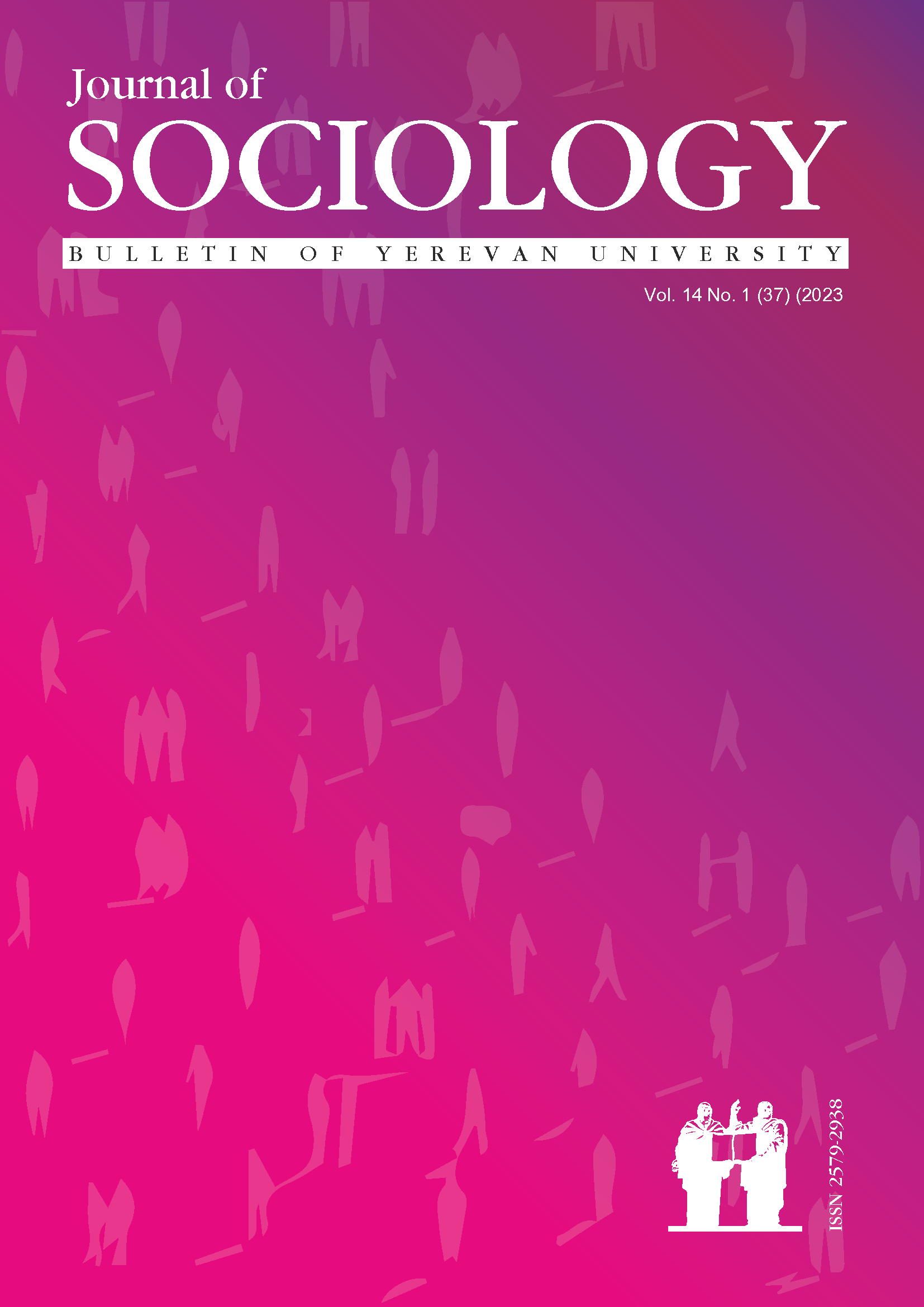Comparative Analysis of the Influence of Coaches' Beliefs on the Attitude of Athletes to the Use of Prohibited Substances
DOI:
https://doi.org/10.46991/BYSU:F/2023.14.1.065Keywords:
social science research, coaches, athletes, beliefs about doping in sport, a cross-national investigationAbstract
This study focuses on the beliefs and attitudes towards doping of Coaches and Athletes in Armenia, Georgia and Moldova, and on the similarities and differences between Armenia, Georgia and Moldova on these measures.
In total, 270 coaches and 810 athletes were selected and completed the questionnaire. Self-completion questionnaires for coaches and athletes were developed in a first-phase Pilot study and approved by World Anti-Doping Agency. Overall, 14% of participants represented team sports disciplines and 86% represented individual sports disciplines. More than half of the athletes were international-level athletes. About 80% of coaches and athletes were males. Whilst there was some variation between the three countries in mean ages and experience of participants, none of these was statistically significant. Analyzing the results, we can conclude that the social and professional behavior of coaches may not be the reason that may push athletes to use the Prohibited substances. The great danger is the illiteracy of coaches in the anti-doping field.
If we compare the results obtained in this study with previous data in other studies, it can be assumed that coaches' delusions are transmitted to athletes, which are formed as a result of receiving incorrect information from other coaches or the media. In some cases, such as in relation to the Prohibited List, this may lead to unforeseen consequences. The obtained results show that it mandatory to include the information in the educational programs for coaches, about the athletes’ duties, ways and means to control their behavior, revealing in detail the mechanisms of such control. A necessary condition for the new Educational program for coaches may also be the holding of education seminars and workshops for athletes with the obligatory presence of their coaches using “the coach and his athletes” formula.
References
Allen, J., Taylor, J., Dimeo, P., Dixon, S., Robinson, L. (2015) Predicting elite Scottish athletes’ attitudes towards doping: Examining achievement goals and motivational climate. Journal of Sport Sciences, 33, pp. 899-906
Backhouse, S. H., Atkin, A., McKenna, J., Robinson, S. (2007) International literature review: Attitudes, 551 behaviors, knowledge and education – drugs in sport: Past, present and future. Report to the World Anti-Doping Agency,
Backhouse S.H., McKenna J. (2001) Doping in Sport: A Review of Medical Practitioners' Knowledge, Attitudes and Beliefs, International Journal of Drug Policy, 22, pp.198–202
Backhouse, S. H., McKenna, J. (2012) Reviewing coaches’ knowledge, attitudes and beliefs regarding 554 doping in sport. International Journal of Sports Science and Coaching 7, pp. 167–175
Cleret, L. (2011) The role of anti-doping education in delivering WADA’s mission. International Journal of Sport Policy 3, pp. 271-278.
Dimeo, P., Allen, J., Taylor, J., Robinson, L., Dixon, S. (2012) Team dynamics and doping in sport: A risk or a protective factor? Report to the World Anti-Doping Agency
Donovan, R.J., Egger, G., Kapernick, V., Mendoza, J. (2002) A conceptual framework for achieving performance enhancing drug compliance in sport. Sports Med., 32, pp. 269-284
Dubin, C. (1990) Commission of inquiry into the use of drugs and banned practices intended to increase athletic performance. Ottawa, ON
Figved, S.E. (1992) Drug education programs for coaches and leaders. Science Periodical on Research and Technology in Sport 12(4),pp. 5-9
Fung, L., Yuan, Y. (2006) Performance enhancement drugs: Knowledge, attitude and intended behavior among community coaches in Hong Kong. The Sport Journal. 9, pp.3-15 Available at http://thesportjournal.org/.
Hovhannisyan, A.S., Sahakyan, A.А, Ukleba, T., Jalleh, G., Donovan, R., Shengelia, R. (2018) Applying the WADA social science research package to assess Armenian athletes’ beliefs about and attitudes towards doping. Proceedings of the Georgian National Academy of Sciences 43, (3-4), pp.145-155
Hovhannisyan, A.S., Sahakyan, A.А, Ukleba, T., Jalleh, G., Donovan, R., Shengelia, R. (2022) Key weaknesses in coaches’ anti-doping knowledge that may influence athletes' use of prohibited substances. A cross-national investigation, Science in sport: modern issue in press
Kirby, K., Moran, A., Guerin, S. A (2011) qualitative analysis of the experiences of elite athletes who have 556 admitted to doping for performance enhancement. International Journal of Sport Policy and Politics, 3, pp. 205-224
Laure, P., Thouvenin, F., Lecerf, T. (2011) Attitudes of Coaches Toward Doping, Journal of Sports Medicine and Physical Fitness 41(1), pp. 132–136
Laure, P., Binsinger, C., Lecerf, T. (2003) General Practitioners and Doping in Sport: Attitudes and Experience, British Journal of Sports Medicine 37, pp. 335–338
Lazuras, L., Barkoukis, V., Rodafinos, A., Tsorbatzoudis, H. (2010) Predictors of Doping Intentions in Elite-Level Athletes: A Social Cognitive Approach. Journal of Sport and Exercise Psychology 32, pp. 694–710
Lentillon-Kaestner, V., Carstairs, C. (2010) Doping use among young elite cyclists: A
qualitative psychosociological approach. Scandinavian Journal of Medicine and Science in Sports 20, pp. 336-345
Lucidi, F., Zelli, A., Mallia, L., Grano, C., Russo, P., Violani, C. (2008). The social cognitive mechanisms regulating adolescents’ use of doing substances. Journal of Sports Sciences 26(5), pp. 447-456
Smith, A., Stewart, B., Oliver-Bennetts, S., McDonald, S., Ingerson, L., Anderson A., Dickson, G., Emery, P., Graetz, F. (2010) Contextual influences and athlete attitudes to drugs in sport. Sport Management Review 13, pp. 181-197
Downloads
Published
Issue
Section
License
Copyright (c) 2023 Areg Hovhannisyan, Gohar Sahakyan, Teimuraz Ukleba; Elena Arhip; Geoffrey Jalleh, Rob Donovan

This work is licensed under a Creative Commons Attribution-NonCommercial 4.0 International License.





